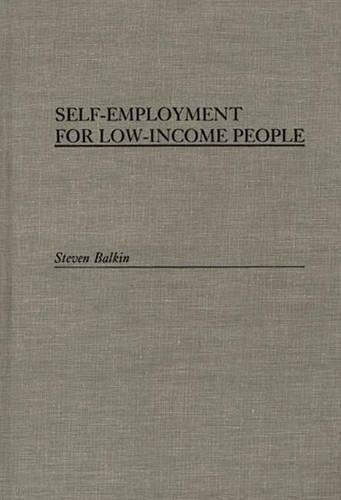
Self-Employment for Low-Income People
(Hardback)
Publishing Details
Self-Employment for Low-Income People
By (Author) Steven Balkin
Bloomsbury Publishing PLC
Praeger Publishers Inc
7th September 1989
United States
Classifications
Tertiary Education
Non Fiction
658.041
Physical Properties
Hardback
258
Description
In this work, Balkin examines whether low-income people should be encouraged to engage in self-employment as a route for economic improvement. The author has gathered ideas and material from a diverse literature and experience base to provide practical suggestions for those who operate self-employment programs, fund self-employment programs, consider policy concerning self-employment, and look for alternative strategies to alleviate poverty, create jobs, and improve economic development. Among the questions Balkin explores are the reasons self-employment is a significant and successful alternative in some ethnic groups but has not been in others, why it is successful in those groups, and whether and how it could become a viable option. Balkin examines the various studies of groups in the U.S. such as the Amish, the Gypsies, and the Koreans, who have tended toward self-employment, using it as a successful mode of economic activity. He explores the cultural backgrounds, forces, and networks that contributed to their success in order to identify the factors most likely to predict the effectiveness of future self-employment efforts and programs. He also analyzes low-income groups where self-employment is relatively rare, suggesting policies and approaches which might be taken to encourage successful self-employment among these groups. Balkin looks at programs in the United States, Europe, and the Third World, which have assisted the self-employed and recommends ways in which policies might be implemented to help U.S. low-income workers undertake successful self-employment. Finally, estimates of the job creation potential for self-employment programs are provided along with a discussion about the importance of evaluation.
Reviews
. . . Balkin examines self-employment as a route for economic improvement. He provides practical suggestions for those who operate self-employment programs, fund self-employment programs, consider policy concerning self-employment and look for alternative job creating and job-reducing strategies.-Entrepreneurial Economy Review
Can people who are unable to earn enough to raise their families above the poverty line because of a lack of education, skills, or sobriety become self-employed and do better both financially and socially Balkin, thinks the answer is yes. He reviews the literature on this topic, including programs that have been tried, both in the US and in Europe. Balkin's judgments are formed by his own experiences in encouraging the development of such self-help programs and writing about them. One purpose of the book is to provide practical suggestions on steps policymakers should take or avoid but, in truth, experience with self-employment programs has been minimal. Perhaps that is why nearly a third of the book is devoted to the entrepreneurial experience of various groups, including the Amish and followers of Father Divine. Readers will be intrigued about the possibilities of turning low-income scam artists, prostitutes, and welfare mothers into commission sales people, masseuses, and vending-stand operators. Excellent bibliography. Provocative reading for academic and general audiences.-Choice
." . . Balkin examines self-employment as a route for economic improvement. He provides practical suggestions for those who operate self-employment programs, fund self-employment programs, consider policy concerning self-employment and look for alternative job creating and job-reducing strategies."-Entrepreneurial Economy Review
"Can people who are unable to earn enough to raise their families above the poverty line because of a lack of education, skills, or sobriety become self-employed and do better both financially and socially Balkin, thinks the answer is yes. He reviews the literature on this topic, including programs that have been tried, both in the US and in Europe. Balkin's judgments are formed by his own experiences in encouraging the development of such self-help programs and writing about them. One purpose of the book is to provide practical suggestions on steps policymakers should take or avoid but, in truth, experience with self-employment programs has been minimal. Perhaps that is why nearly a third of the book is devoted to the entrepreneurial experience of various groups, including the Amish and followers of Father Divine. Readers will be intrigued about the possibilities of turning low-income scam artists, prostitutes, and welfare mothers into commission sales people, masseuses, and vending-stand operators. Excellent bibliography. Provocative reading for academic and general audiences."-Choice
Author Bio
STEVEN BALKIN is Associate Professor of Economics at Roosevelt University. He has published on a wide variety of criminal justice topics. His research interests are poverty and economic development, focusing on issues relating to self-employment and microenterprises.
